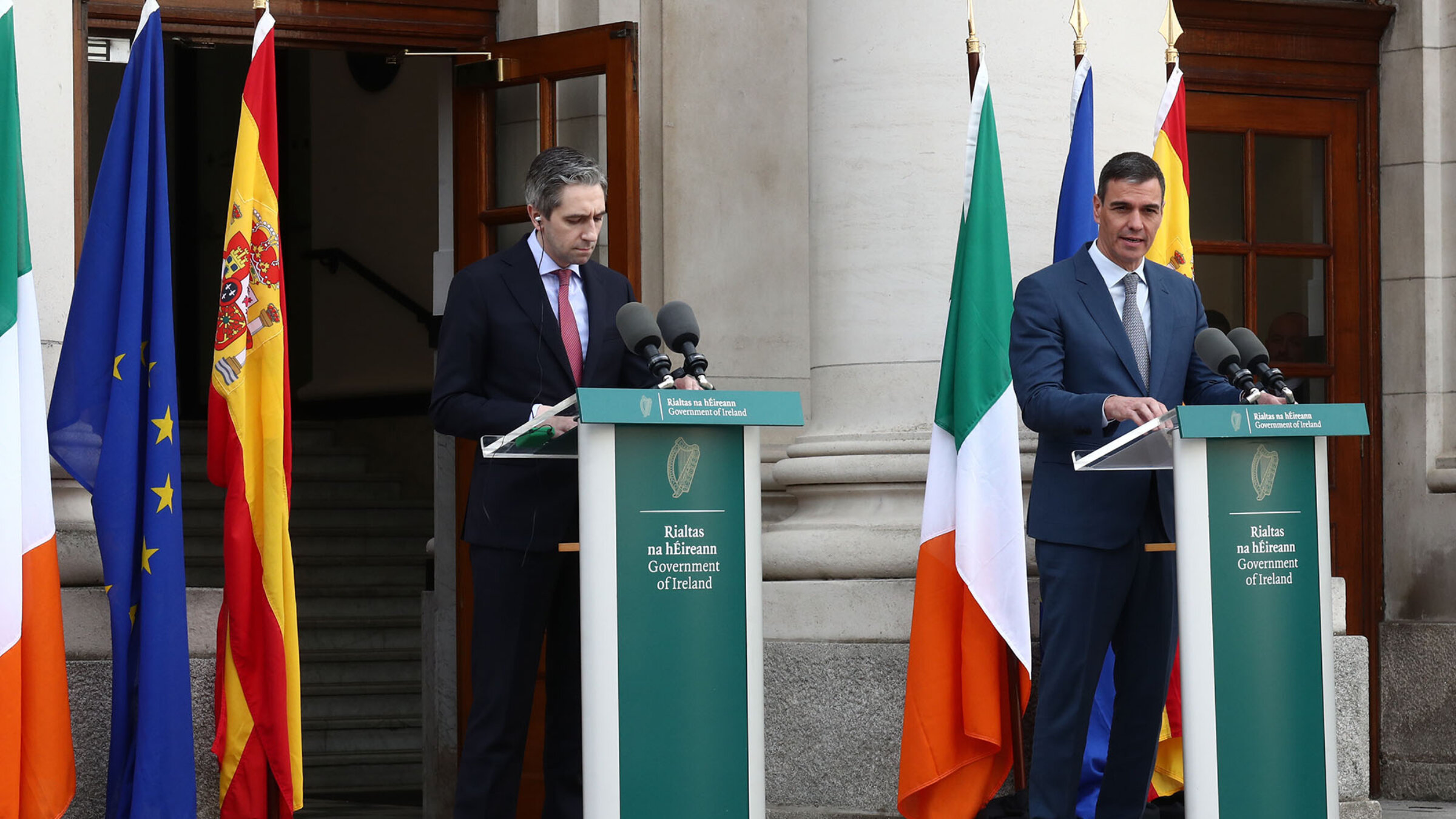It’s time for American Jews to recognize a Palestinian state
Recognition won’t ‘reward violence’ — instead, it will help ensure a strong future for the Jewish people

Spanish President Pedro Sanchez (R) and Irish Prime Minister Simon Harris speak to the press after an April meeting in Dublin at which they expressed willingness to endorse a Palestinian state. Photo by Moncloa via Getty Images
There’s one question that should guide nations — or you, or anyone — in deciding whether to recognize a Palestinian state: Will doing so bring Israel and Palestinians closer to peace, or not?
Given the state of the conflict, I give the argument to Team Recognition. It’s time for American Jews to recognize the State of Palestine.
The do-or-die importance of not recognizing the state of Palestine has become an article of faith among mainstream Jewish groups, and thus, among mainstream American Jews. But like most articles of faith, it begs scrutiny. And following Spain, Norway and Ireland’s Wednesday announcement that they will recognize Palestinian statehood — which earned instant condemnation from the government of Israel — it’s clear that scrutiny is more important than ever.
I didn’t always support the preemptive recognition of an independent Palestinian state. In the aftermath of the 1993 Oslo Accords, withholding recognition in order to encourage a continued peace process made a kind of sense, because Yasser Arafat, then the chairman of the Palestinian Liberation Organization, could have pocketed the achievement of recognition without making any meaningful concessions to Israel, or accomplishing any lasting gains for Palestinians.
What’s changed?
Most importantly: Benjamin Netanyahu. In his 16 total years as Israel’s prime minister, Netanyahu has consistently opposed the two-state solution. You can’t use recognition of a Palestinian state as a carrot when Israel’s leader is only interested in sticks.
That’s the logic Norway’s government employed this week, when, in announcing its recognition, it emphasized the goal of a two-state solution.
“In the midst of a war, with tens of thousands killed and injured,” said Norway’s Prime Minister Jonas Gahr Støre, “we must keep alive the only alternative that offers a political solution for Israelis and Palestinians alike: Two states, living side by side, in peace and security.”
That’s a key point. Recognition is a blow to Hamas and its supporters who don’t want a Palestinian state beside Israel, but a Palestinian state instead of Israel.
Recognition creates a political pathway beyond war at a time when Israel’s own Defense Minister, Yoav Gallant, has publicly accused Netanyahu of having no inkling of one. Gaza is in ruins, but recognition sends a message to Palestinians that the world is actively seeking an alternative to Israel’s open-ended occupation of the West Bank, to the cynical Hamas leadership that sparked this destructive cycle of conflict, and to the prospect of Israel asserting long-term control in Gaza.
Of the United Nations’ 193 member countries, 143 have recognized Palestine, five of them since Oct. 7. Spain, Norway and Ireland’s recognition adds particular political and moral heft to that number because most Western governments, following U.S. policy, have resisted doing so.
It’s time for American Jews to take the message and reverse that old taboo about recognizing a Palestinian state. After all, the majority of American Jews support Israel, and recognition is a clear, nonviolent way to spur a negotiating process that could help ensure Israel’s long term survival.
And recognition aligns with the goals of the plurality of American Jews, 46% of whom believe a two-state solution is the best possible outcome to the conflict, according to a Feb. 2024 Pew survey. (20% favor a one-state option, and 22% hope for Israel to control all the land between the river and the sea.)
The counterargument that Israel’s leaders have put forth is that recognizing Palestinians rewards violence. “The countries that recognized a Palestinian state today are giving a reward to murderers, kidnappers and persecutors,” Israel’s National Security minister Itamar Ben Gvir said Wednesday.
That argument would have more weight if Israel supported recognition in times when terrorism subsided. But in 2013, when the number of Palestinian terror acts were at their lowest point in a decade, Netanyahu actually became, in the words of analyst Barak Ravid, “more hawkish than ever,” adding a new demand that Palestinians recognize Israel as a Jewish state.
In reality, violence has never been a deal-breaker for independence or statehood, anywhere in the world. Often, it’s been a prerequisite. Terror committed by Jews against British colonizers sped up the withdrawal of the British from Mandatory Palestine. And Ben Gvir himself, who openly supported the violent Kach movement, is a poster boy for success-through-violence.
Besides, if Israelis can use the excuse that recognition rewards violence, Palestinians can claim that compromise with Israel rewards occupation. Better to brush aside these fears, or pretenses, and focus on what next steps would be effective.
American Jews aren’t Norway, Spain or Ireland, so what exactly would recognition look like? Individually and collectively, it means conveying to our leaders that we support a State of Palestine alongside a State of Israel, and now is the time to use what leverage America has to achieve it.
On Wednesday, President Joe Biden once again rejected the idea of recognizing a Palestinian state apart from a negotiated settlement. By recognizing a Palestinian state, American Jews would encourage the President to be bolder in pursuing the fast-disappearing option of a diplomatic solution to the Israeli-Palestinian conflict. Such a move doesn’t reward violence; it punishes rejectionism. If you believe in a future in which Israel is able to maintain peace and security, it’s time for you to realize that recognizing a Palestinian state is good for the Jews.















